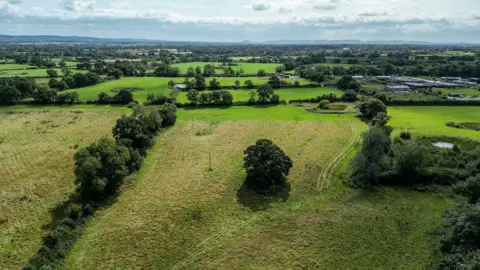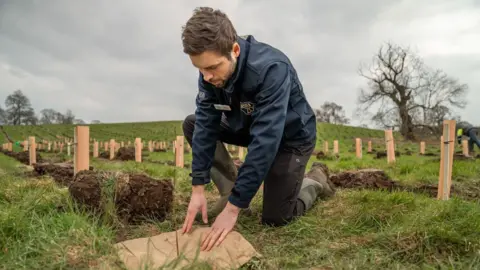Zoo plants 19,000 trees in unused field
 Chester Zoo
Chester ZooA zoo has said it has helped create a new sanctuary for UK wildlife by planting nearly 19,000 trees in an unused field.
Chester Zoo has planted a new area of woodland across nine-hectares of a low-biodiversity silage field in Upton, Cheshire.
The attraction said it was their biggest habitat creation project to date and one of the largest tree planting projects to take place in the county in several years.
Jennifer Kelly, Chester Zoo's head of sustainability, said the new woodland would provide a "lasting legacy for future generations".
 Chester Zoo
Chester Zoo 'Wildlife can move safely'
The initiative, which forms part of a wider wildlife corridor across the region, has seen a diverse mix of UK native broadleaf trees species, including oak, beech and hazel, planted to provide high biodiversity benefits and resilience to climate change.
It has been funded by the Department for the Environment, Food and Rural Affairs (Defra) through the Nature for Climate Fund, and delivered in partnership with the Mersey Forest.
Dr Simon Dowell, director of science and policy at the zoo, said the woodland, once established, would provide a "richer and more diverse habitat for a range of species".
He said it would help to bring in species including green woodpeckers, badgers, harvest mice and butterflies such as the speckled wood.
"Its location was carefully chosen to link two existing but much smaller woods, forming a continuous woodland which spans almost 13 hectares in total," he said.
"With hedgerows adjacent to the woodland edge, it'll enable wildlife to move through the landscape much more safely."
He added: "This really is an amazing woodland for the future."
The zoo's tree planting project contributed to Cheshire West and Chester's Nature Recovery Strategy, a plan to help wildlife thrive, improve the ecological network and target investment in nature in the region.
Tree planting is a key part of the UK government's plan to combat climate change and reach net zero greenhouse gas emissions by 2050, with a target to plant 30,000 hectares of new woodland every year by 2025.
Listen to the best of BBC Radio Merseyside on Sounds and follow BBC Merseyside on Facebook, X, and Instagram. You can also send story ideas to [email protected] and via Whatsapp to 0808 100 2230.
